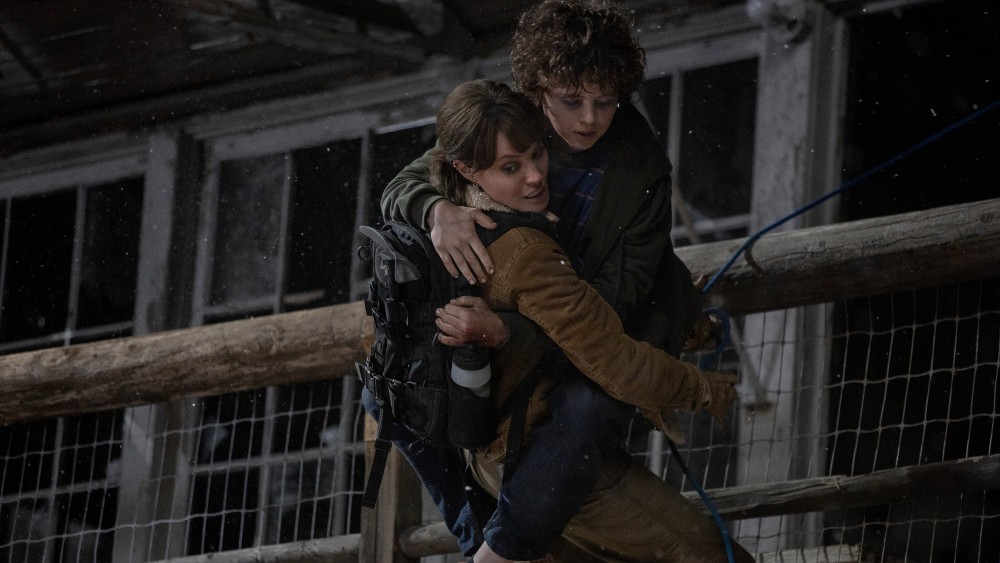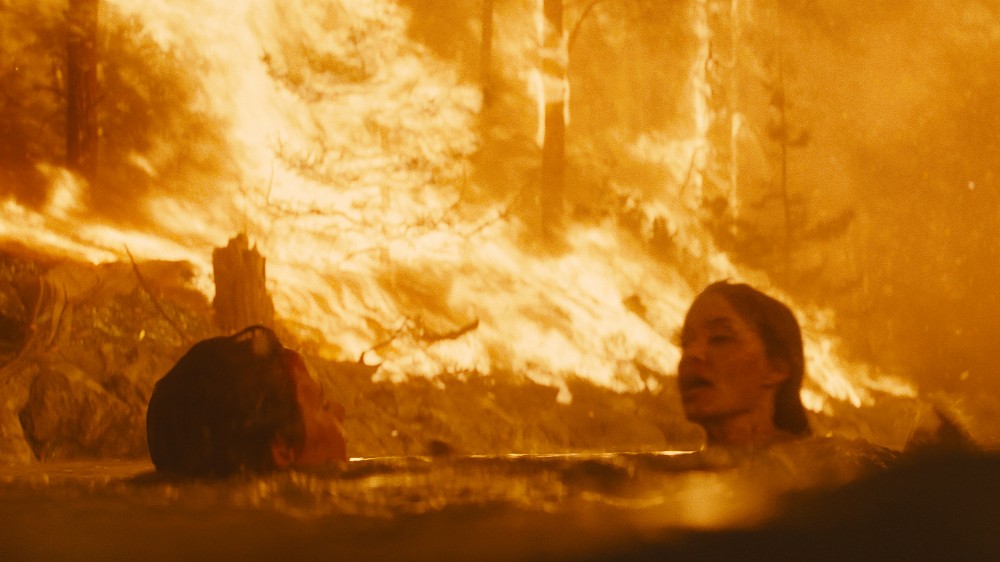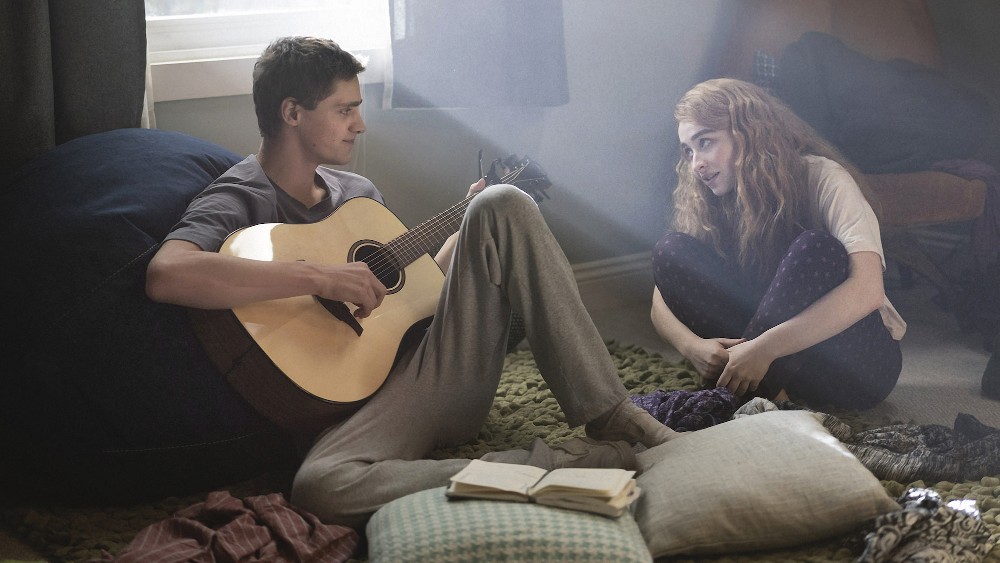
Unless you’ve been living under a rock for the past 20 years, you’ve heard the music of Composer Brian Tyler.
If that sounds like a challenge, then you should look over Tyler’s impressive filmography. You’ll see that he’s provided music for huge blockbuster franchises like the “Fast and the Furious” movies, a slew of Marvel Studios movies, horror films, and everything in between. In fact, Tyler reunited with Director Justin Lin for F9, the latest in the franchise they both joined with 2006’s Fast and Furious: Tokyo Drift and the sixth movie in the series scored by Tyler.
Tyler’s most recent scoring work is for two very different movies, the Disney+ drama, Clouds, based on the true story of young musician Zach Sobiech (played by Fin Argus), who on being diagnosed with a lethal case of cancer decides to use his last few months of life to make an album. It was a story that turned into a viral music sensation.
Tyler also scored Those Who Wish Me Dead, his latest collaboration with filmmaker Taylor Sheridan, an action-thriller starring Angelina Jolie, in which she plays Hannah, a fire jumper in Florida, who has to protect a young boy (Finn Little) being pursued by assassins in the midst of an out-of-control forest fire. That movie continued Tyler’s work with Sheridan from the Paramount Network series, Yellowstone, which Tyler also scores.
Both of these scores are very different from what we might expect from Tyler’s always dynamic scores for big action blockbusters, because both films involve a lot more finesse in capturing complex emotions but in the latter’s case, also keeping the audience on edge with the tension of what might happen next.
Below the Line spoke with Tyler over the phone for the following interview, an extended conversation about Tyler’s process of writing and recording, playing many of the instruments himself, as well as briefly touching upon F9.

Below the Line: I was reading about your background and saw that you went to UCLA and Harvard, but did you go to those places to study music and composition?
Brian Tyler: No, that’s just it. I’m mostly self-taught actually in all instruments, but at one point, I was doing piano training and everything. The thing was that I had a good ear in almost an identic way, so I would listen to music, and I would never really got caught that that’s what I was doing until one day I played a Chopin concerto. I learned it slow, so I learned it one step flat. So I played the whole thing pretending to read it, but I was reading a step flat, and it was like a nine-minute piece. I remember, Trudy, my teacher was like, just kind of just had this look like is something wrong in my brain? What is going on? He’s playing it in a different key — is he transposing on the fly? Most of it was that, and then I studied philosophy and history, but music was always my passion that took up all my time.
BTL: What’s your writing process like, since you foray into so many different musical styles in your scores? Are you writing on different instruments?
Tyler: There’s stylistically two kinds of composer, and I guess I could be called an impressionist. When I’m writing, I hear it first in my head, and then I have to kind of write it down. It’s not so much writing on different instruments. I kind of hear it in my head, pretty much in a complete form. It’s kind of strange — I don’t know how that works, honestly. It’s great, but at the same time, it’s a little terrifying, because you don’t know just when the radio in your brain is going to turn off, but it pretty much comes fully formed. I am proficient on different instruments, so when I want to do something that’s just to get down melody and chords and those kinds of things. I usually go to the piano, but often I’ll do it in different ways. Sometimes, I just write it on paper. There’s been whole movies that I’ve done, where I’ve had a lot of trust with the director, and I said, “I really want to do this with a quintet and a couple of woodwinds except that I don’t want to rely on having to do mock-ups, because then you tend to write for the samples to make them sound good.
I’ve been fortunate enough to have done enough things and worked with enough directors that there’s been occasions where I can sit down and just write it how I feel it should be. The reason why I love playing cello — and I play something like 34 or 35 instruments — I love being able to sit down and just record, because I often do cello solos on my scores or drums or piano solos or guitar, bouzouki or even like koto or instruments from around the world. Sitar you know. [On] Partitions, a movie from India, I played lots of Indian instruments and Pakistani instruments. I feel that if you know how to play the instruments or at least give it a go, as a composer, when you’re writing for that instrument, you’re going to be able to lean into it more. You know when a violinist has an open G string, and it’s easier to do it in this key with this scale, and if it’s a quick run up to high A, or something like that. If you finger it in a certain way, you might change the notes thinking, “Okay, a violinist is gonna play this.”
I find it really useful. Something I do often when I hear a composition, even if I don’t know who the composer is, you can often tell, “Okay, this person’s main instrument was…” Often you hear violas and cellos, violins, anything in the string section, being written as if it was a piano, so the violin player is playing piano lines, because a person is so accustomed to piano that they don’t think like a violinist. It’s not even a criticism; it can create very interesting things where you can hear even horns being played as if they’re a cello, because I could tell that person wrote it for their primary instrument was probably a cello. I kind of tried to actually, since I did that, I just found that to be a very useful thing. So that’s kind of the process.
BTL: So when I hear drums on some of your scores, is that you actually playing drums usually?
Tyler: Always, always. Everything from Crazy Rich Asians to the Fast and Furious movies, yeah. One of the first instruments I played were the drums. I was a session drummer in LA — I was like 14. That was something that I did really early on, would play the NAAM show, and I was like a child [prodigy], and then I also started touring at like 15 as a pianist, like in Europe. It was those two things. I loved playing guitar. I was in bands and things, but started playing on albums and things like that when I was around 14, but drums were the first professional gigs that I did.
BTL: I’ve spoken to a few multi-instrumentalist composers, but a lot of times they just play good enough to write or throw down ideas but then hire professional musicians to record.
Tyler: I’ve done sessions as a session guitarist, a session pianist and a session drummer. Those are the things that I could consider like.. and then like a cello, I can certainly play with a quintet but I’m not going to stake claims. Whatever sounds good. I love being able to lean into it, and do it because I have so many… I’m sitting in my studio right now, and there’s marimbas and vibraphones and two different pianos, and I probably have about 30 guitars and two drum kits and drums from all around the world. There’s a koto and there’s all these things. That was one of the things, learning to play the koto, something that I really wanted to do, because I did so many movies in Asia, and actually, I use that a lot. Sometimes I won’t have a harp player on the session, so I will play a koto, kind of like a harp, but sometimes I’ll also play the harp — I have a harp here as well.
BTL: So you haven’t had as many issues having to do Zoom issues with musicians and dealing with sync, since you can do so much by yourself in your own studio.
Tyler: A little of both. A lot of my scores are layers of me. I love synth programming, too, and super super in production, that’s probably the thing I do… I just love diving in, and that’s why I produced hip hop records. I’ve worked with a lot of artists, everyone from Ray Strummer to Zed to Kill Da Noize. I’m still very linked into that world almost as much as film scoring, but in terms of pandemic, I actually did do a couple of things. I probably had maybe 10 or 12 orchestral sessions that I actually conducted. One time, I conducted the Vienna Symphony, but I was in LA being filmed at the Fox scoring stage at 20 Century Fox in LA by myself, and they’re filming me conduct, and they beamed it onto a big screen in Vienna. And then I did record remotely in Los Angeles for Fast and Furious 9, but I didn’t conduct it. I usually always conduct orchestras, but that one I just monitored remotely. We recorded at Abbey Road. Then, I also did another one in Vienna as well, for Redeeming Love, coming out I think oer the summer, which is a 19th Century romantic, tragic story of this girl set against the West and the Gold Rush.
Gil Shaham, my favorite violinist in the world that I’ve idolized forever. He’s like John Williams’ violinist, this amazing soloist from Israel. I recorded him in New York playing in a concert hall by himself AND recorded remotely in Austria linked-up via computer and watched the orchestra in Vienna play. It’s crazy. Those Who Wish Me Dead, I recorded that in Los Angeles, but each day was a different part of the orchestra, with everyone sitting like eight feet apart. which gives the woodwinds this really cool, wide, beautiful, haunting sound that actually is part of the sound of Those Who Wish Me Dead. It sounds so different than anything. We leaned into it and made it really haunting… the woodwinds are just like crying like, “Find me,” almost like a lost child. It’s just beautiful sometimes, so sometimes, COVID can create beautiful things.
And then Are We Dreaming, which I’m directing, which is a completely immersive, audio visual experience, like it’s Fantasia meets 2001, and it’s done live. It’s like a completely wild audio-visual musical experience. You go through the Andromeda Galaxy, and it takes place over 18 billion years of history. It starts at the beginning. It’s our future, and will we beat the death of the universe? It’s these really big ideas of who we are, shot all over the world. That one, I did all the music myself and worked with some artists, but that was very much one of those things that not only was the music that I was doing, but directing and visuals, and I’m the editor and I color-time, and I do all sorts of things within it.
BTL: Was that your pandemic project?
Tyler: I started writing it before the pandemic — I started filming back then, and worked right through. It’s been over 25 years I’ve been telling other people’s narratives, and all this time, I’m now being able to tell my own narrative, instead of writing music reacting to what I see on the screen, I’m doing it the other way around. I’m making music and then creating visuals around them. It’s completely inverted from what the normal process has been. It’s been absolutely amazing.

BTL: Going back to Those Who Wish Me Dead, obviously you’ve scored three seasons of Taylor’s Yellowstone show, so was it an organic transition into scoring his movie, while doing music for the show at the same time?
Tyler: It’s interesting. It’s so different in terms of the music I love working with Taylor, and he’s brilliant. We had this challenge of doing something that was very emotional but has a lot of heartache in it. There is aspiration and regret and melancholy and danger and love and loss and all these things within the score that’s really this triangulated suspense movie. But it’s really the story of this boy and this woman that both have all these regrets and loss in their life, that they now are fighting against, not only man and like the evils of man, but also the indifference of nature and fire. The human villains of the movie and our main protagonists have the same common enemy, which is this encroaching indifference, fire power. It’s really a cool like triangle of a story, which is very different than Yellowstone, being more of an almost modern day mythology of this family and what is going on with this land and these characters that all interact, which is this beautiful kind of a quasi mythological, amazing, Yellowstone is what it is. They’re so different that I found that it was really cool to do music that was very different. I love working with him, because he always pushes the boundaries
BTL: When you knew Taylor was directing it, do you start writing melodies or themes or do you always wait until you see picture or some kind of edit?
Tyler: With him, I always start writing ahead. When we start talking about concept, something I knew about these characters was that they always had to be looking at their past and learning to look forward and kind of that ambiguity of being where you’re at. In terms of writing, I sat down and the first thing that I wanted to do — and Taylor was really into the idea — was write something where your brain was not sure where the tonal key center was. When people ask me, “What’s your key center” or “What’s the key of Yellowstone?” It’s like in the key of ambiguous. The core is to never land on a central [chord] … it just kind of starts moving, and “Which chord is the central key?” and your brain is never settled. You’re constantly in that beautiful gray between the white and the black of easy emotions of film, and you kind of are left in the melancholy world. The melody is always looping around in a way that you can really remember it, but it has this cyclical, ambiguous feel. Also, I recorded in different meters, the different sections of the orchestra, sometimes, on certain pieces on different days. I would have the woodwinds in 7/8 and the strings in 4/4, but on the same piece, so you have this asymmetric rhythmic tempo to it. It also kind of keeps you guessing.
All these things were just kind of these conceptual ideas that even before shooting, also burning a cello and playing it, that was kind of crazy. I set one on fire, and I played it. It was crazy. One, it’s so hot, and two, it’s unbelievable. I hadn’t really gotten that close to a fire. But yeah, the sound of it warping and burning, that became part of the sound design embedded within certain pieces of music. You don’t really realize it’s there. And even piano solos were disconnected from its original sound. I would play the piano and the reverb of the piano would be out of tune on purpose, detuned almost like how our memories aren’t actually correct versions of what happened. We tend to blame ourselves and have regret where we’re too hard on ourselves in that way. It’s kind of a really melancholy, emotional, heartfelt piano melody for our two main characters. The second that you hear the note, instead of having that pure piano tone, the sustain would be out of tune with itself, not so much that you think “Oh, this is ugly.” It’s actually very beautiful that way. I kind of almost prefer it in some ways. These kind of concepts ended up being things that impracticality worked for the film once we got there. And that tends to happen when I work with Taylor.
BTL: I’m not that musically proficient that I could tell that was happening, but there were definitely some interesting things happening in that score.
Tyler: Musically, and sonically and kind of rhythmically, all three of those things are just a little bit off-center enough for you to feel like “This is an interesting listening experience that’s making me feel kind of a certain way.” I love all the shades of grey that music can very precisely place you in. One note different in a melody can make you feel wonderment, but wonderment from a child’s eyes, and then you can slightly change it and make it wonderment in a way that is with great knowledge and experience, and all of a sudden it’s like an older wonderment. It’s really crazy what just the scales and the distances between notes and that physics of sound can make your brain kind of have emotion that is universal across any culture. It’s fascinating.

BTL: Let’s talk about Clouds. I didn’t know what the movie was when I saw your name as the composer, but I thought it was just such a beautiful score even when removed from the story about the pains of cancer. How did you approach that one?
Tyler: So for me, that was a high bar, because here I’m writing music for a movie with a character that was a real person that had just passed away. He’s 17, I talked to his family. What I kind of needed to do was get into the headspace of Zach Sobiech, since it’s about a musician that died at 17 from cancer. I wanted to celebrate his life in a way, so they got me his mixtapes. What was he listening to at the time? What was he learning as he was growing as a musician? I kind of approached the score from what I thought, if he continued and decided to become a film composer, this was what he would have written. Even following how he would do chords and things like that. If he really learned for the next 20 years. So I played all the instruments, but they’re instruments that he loved to play. So I’m playing guitar and I sing on it, ], that [sings a melody]. That’s another thing — all the vocals tend to be me on my scores.
He was a DIY kind of guy and so that’s what I wanted to do and make it really ethereal and it’s uplifting joyous, but at the same time, you have that lump in your throat, that that your heart hurts and aches in a way that is the case when you lose someone that’s close to you. I knew I was gonna play this music for his family and his sister and his ex-girlfriend and all these people would hear it. It was really the most important approach that I had writing a theme. I just felt a lot of responsibility for it, so that’s why it’s so personal, and it sounds so much in that beautiful melancholy that is life. It was just kind of looking towards in my mind, almost like wanting to write it with Zach.
BTL: It seems like such a different movie for you, and the score is just so beautiful, even when you listen to it on its own.
Tyler: That director, Justin Baldoni, did another movie that is a tough movie, it’s melancholy and really beautiful, called Five Feet Apart that I also scored. And if you liked Clouds, you should definitely check out that score. That one has this haunting, really like understated, but hopeful looking inward and outward and upward and all sorts of things. My favorite kind of tone in terms of writing is melodic and melancholy and emotional. That’s actually my wheelhouse versus action. Action was actually something that just kind of happened. I love it, too, but that’s why Those Who Wish Me Dead, that score is actually very emotional and goes into those gray areas of emotion that would be my kind of field of expertise where I am best. It’s been great being able to have that canvas but certainly because I’m directing Are We Dreaming?, it goes there.
BTL: I haven’t seen F9 yet, but I was curious about working with Justin Lin again. You guys did so many movies together, but then he left the franchise and you kept doing the scores. So what can you say about him coming back?
Tyler: This is a big return for Justin, and boy, the score is like a whole new thing where definitely, you know it’s Fast and Furious, and we echo the past, and we get to go into themes that go all the way back now to Tokyo Drift, because the connection between Fast Nine and Tokyo Drift is so much of a thing with [Sung Kang’s character] Han and everything. The scale of the drama in terms of the storyline and the character arcs everything, it is really going into such an interesting, really amazing storyline that no one could have thought of when the first movie came out. It’s really grown so much, and Justin has a way of shaking things up. The music is right along with that. We’re so proud of this. [It’s] Justin’s favorite score, 9 is, and it’s really cool to see just the excitement of Justin and everybody involved in the movie about the music. While we’re doing something that is quite new and taking a step into the next gear so to speak. It becomes very epic and just powerful and all these things. I’m super excited for people to hear that and to see the movie. The movie’s great.
Clouds is now available to stream on Disney+*, Those Who Wish Me Dead is still playing in theaters and will stream on HBO Max through June 13, while F9 will be released theatrically in North America on June 25. Tyler’s score can also be heard in the July horror sequel, Escape Room: Tournament of Champions.
(*Clouds is eligible for the Emmys in the “Outstanding Music Composition for a Limited Series, Movie, or Special (Original Dramatic Score)” category. The score for Yellowstone Season 3 by Tyler and Breton Vivian is eligible in the “Outstanding Music Composition for a Series (Original Dramatic Score)” category.)





